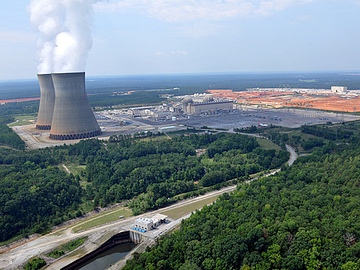
The Vogtle nuclear power plant near Augusta is in the midst of construction. Crews are preparing to build two new reactors. The cooling towers and dome-shaped tops of the two existing reactors are seen in the foreground of this photo, while the clay-colored ground in the background is where crews are preparing for the new reactors. (photo Southern Company).
Industry groups say, the region is growing at a rate that demands cheap power.
But others aren't so sure.
Critics say, there's nothing cheap about nuclear and consumers will be the ones paying the price.
One thing is certain, however.
Nuclear is rising in the South because of the region's politics.
In the dusty red clay south of Augusta, construction crews are busy moving dirt and equipment at Plant Vogtle, a Southern Company nuclear plant where two reactors already are operating.
With its two iconic cooling towers rising in the distance, workers are preparing the site for two new reactors.
A perky, hard-hatted tour guide stands perched above a 40-foot-deep partially-walled-in hole in the ground.
"The wall that you see straight ahead, that's where the Unit Four nuclear plant will go," says the guide, Mike McCracken.
He points to a brown metal bowl the diameter of two school buses just behind him and says, soon, a crawler and a crane will get that bowl, a nuclear containment vessel, into the hole, a new landmark in America's energy history.
"That's where the reactor vessel will be," McCracken says. "That's where the steam generators are located. That's where we're splitting atoms to make the heat that turn the water into steam."
This country hasn't built new reactors to split atoms for electricity in three decades.
When construction is complete here in about five years, Plant Vogtle will punctuate the Obama administration's energy policy and mark the end of an estimated $14 billion investment.
Savannah environmental activist Steve Willis says, the average Georgia Power customer already is paying more than $4 a month for the reactors.
"Nuclear energy is by far the most expensive way to boil water," Willis says. "It's a sink for money."
Willis opposed a state Public Service Commission decision two years ago allowing Georgia Power, a Southern Company subsidiary, to charge customers now for reactors that won't come online for years.
Scott Peterson of the industry-friendly Nuclear Energy Institute says, the South's preference for regulated over deregulated markets is one of the prime reasons the region is getting nuclear power.
"They are very high in capital costs," Peterson says. "Companies typically have to recover their investment as they go. And working through the Public Service Commission, you can set the conditions where those companies can ensure there's a reliable and affordable production of electricity for their consumers."
Lawmakers set those conditions.
They ensure customers get electricity while the company is guaranteed profits.
Other regions take a more market-driven approach to electricity.
Ellen Vanko of the anti-nuclear Union of Concerned Scientists says, in those regions, nuclear power plants aren't being built because customers aren't willing to pay for them.
"The market has clearly spoken on nuclear power and it has for years," Vanko says. "I don't think the customers have any real understanding of the impact of these plants on the rates they're going to pay once they're actually operating."
Vanko says, Wall Street wouldn't finance the South's expensive push to nuclear without $8 billion in federal loan guarantees.
Even with the government's help, the average Georgia Power customer will be paying about $120 a year more.
Southern Company spokesman Mark Williams says, Southern states are getting nuclear power because the region needs a steady source of electricity.
"The Southeast remains one of the fast-growing parts of the country and it's projected to still be that way in the future," Williams says. "We determine, through a partnership with our state regulatory agencies and other stakeholders, what we're going to need to do in the future to meet the energy needs in Georgia."
Williams says, the elected Public Service Commission ensures rate-payers are getting the best long-term deal, by scrutinizing costs.
Nuclear boosters say, that contrasts with a more market-based approach that looks at more short-term benefits.
"One of the things you want from a business standpoint is stability in the process," Peterson says. "You need to be able to predict what your costs are going to be and how you're going to recover the investment that you're going to make in those plants going forward."
PSC Chairman Tim Echols echoes that line of thinking.
"It was the right thing to do to help with nuclear power," Echols says. "I hope that we can finish the plant on time and on budget or all of us will probably look back and ask, 'Was that the best decision?'"
If costs do go over, the PSC would determine who would pay for those expenses, the company or its customers.
Anti-nuclear campaigners point to ballooning cost estimates at proposed reactors elsewhere and doubt whether the companies building them in the South can keep their promises to rate-payers.
Former U.S. Nuclear Regulatory Commission member Peter Bradford says, the only other nuclear plant likely to go forward with expansion, along with Vogtle, is the V.C. Summer Nuclear Station in Jenkinsville, S.C., operated by energy producer SCANA.
"Vogtle and Summer are both uneconomic plants," Bradford says. "They're both being built only because the state utilities commissions are requiring that the customers pay for them many years in advance of their completion."
The U.S. Nuclear Regulatory Commission could give final approval to construction of the new Vogtle reactors any day now, already having approved their design late last year.
LINK

No comments:
Post a Comment
This is an unmoderated blog. Please be professional and respectful as you post.